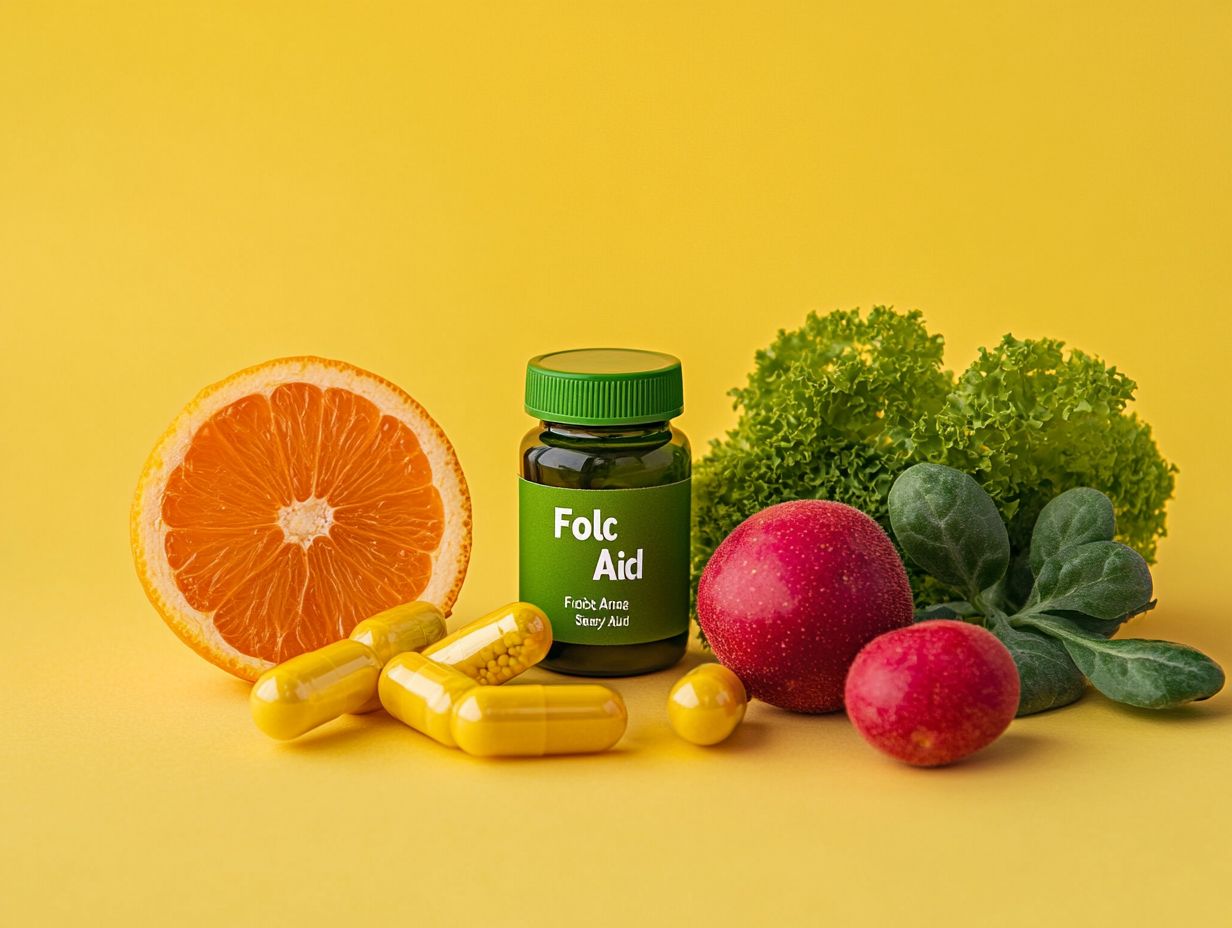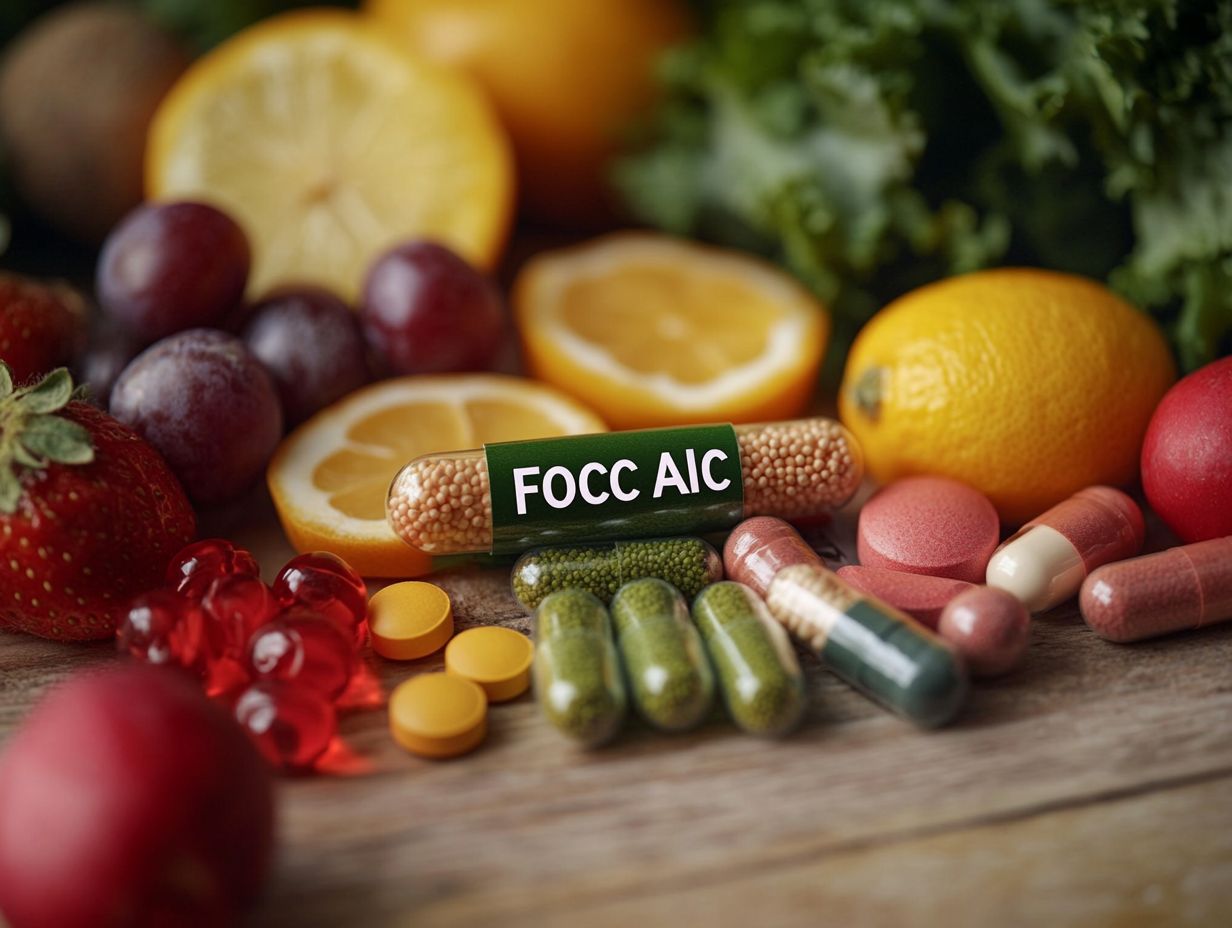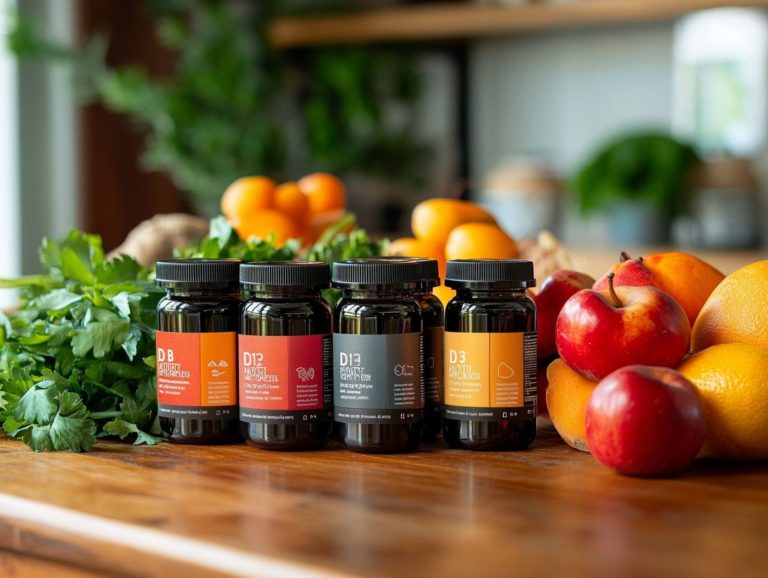The Importance of Folic Acid in Dietary Supplements
Folic acid, a vital B vitamin, plays an indispensable role in various bodily functions, from cell division to DNA synthesis.
Recognizing its importance is essential not just for women of childbearing age but for anyone striving for optimal health.
In this article, you ll explore what folic acid is, why it matters, and how to weave it into your diet.
You ll learn about recommended daily intakes, signs of deficiency, and expert tips for selecting the right supplements.
Discover how folic acid can transform your health!
Contents
- Key Takeaways:
- What is Folic Acid?
- Why is Folic Acid Important?
- Where to Find Folic Acid: Your Guide!
- Recommended Daily Intake of Folic Acid
- Folic Acid Deficiency and Symptoms
- Choosing the Right Folic Acid Supplement
- Frequently Asked Questions
- What is the role of folic acid in dietary supplements?
- Why is folic acid important in dietary supplements?
- How much folic acid do I need in my dietary supplements?
- What are the food sources of folic acid?
- Are there any risks associated with folic acid in dietary supplements?
- Can I take too much folic acid in my dietary supplements?
Key Takeaways:

- Folic acid is a B vitamin that plays a crucial role in many bodily functions, including cell growth and development.
- Supplementing with folic acid can provide numerous benefits for overall health, such as reducing the risk of birth defects and heart disease.
- Natural sources of folic acid include leafy green vegetables, while supplements are available in various forms and dosages to meet individual needs.
What is Folic Acid?
Folic Acid, or Vitamin B9, is a water-soluble vitamin that holds a crucial position in several biological processes. These include DNA synthesis and cell division.
It’s essential for maintaining optimal health and warding off diseases linked to folate deficiency, like megaloblastic anemia.
You ll commonly find this vitamin in dietary supplements and fortified foods. Folic acid is absorbed in the intestines through active transport mechanisms.
Grasping its functions and significance can enhance your overall nutritional well-being.
Definition and Role in the Body
Folic Acid is essential for DNA synthesis and the formation of red blood cells. This underscores its vital role in cellular functions and overall health.
This essential nutrient is pivotal in numerous biochemical processes. These include nucleotide synthesis, which is crucial for DNA replication and repair.
It acts as a coenzyme in transforming homocysteine a substance in the body that can affect heart health when levels are too high into methionine.
By engaging in critical chemical reactions that affect how genes work, it influences gene expression.
Maintaining adequate levels of folic acid is necessary for producing purines and pyrimidines two fundamental building blocks of DNA.
By supporting these processes, this vitamin helps safeguard the integrity of your genetic material and ensures proper cellular division.
This shows just how important it is for growth and development, as well as in preventing conditions like anemia and congenital birth defects.
Why is Folic Acid Important?
Folic Acid is essential for a myriad of health benefits, establishing itself as a cornerstone of optimal nutrition, especially for pregnant women.
It plays a crucial role in significantly reducing the risk of neural tube defects in developing fetuses.
Having enough folic acid helps support the production of red blood cells and maintain healthy levels of homocysteine.
It also collaborates with Vitamin B12 to enhance your body s methylation potential.
Benefits for Overall Health
The consumption of Folic Acid presents a wealth of health benefits for you. Notably, it aids in the prevention of neural tube defects in fetuses and enhances cardiovascular health.
This essential B-vitamin is crucial for DNA synthesis and repair, making it vital for cellular division and growth.
Research shows that maintaining adequate levels can significantly lower the risk of congenital anomalies, especially spinal bifida and anencephaly, during pregnancy.
Beyond its undeniable role in prenatal health, Folic Acid is also associated with mental well-being.
Studies suggest it may help alleviate symptoms of depression and anxiety.
By promoting neurotransmitter function, this nutrient aids in mood stabilization, leading to improved overall emotional health.
Therefore, ensuring you maintain proper Folic Acid levels can have a profound impact on both your physical and mental wellness.
Where to Find Folic Acid: Your Guide!

Folic acid is readily available from a range of sources, both natural and supplemental. These sources deliver essential nutrients that support your optimal health. You can find natural food sources rich in folate in leafy green vegetables, legumes, nuts, and fortified grains.
You can also find dietary supplements easily to help you meet your recommended intake. It’s important to grasp the distinction between dietary folate from food and synthetic folic acid. This is particularly relevant for preventing health issues like megaloblastic anemia, a condition where the body produces large red blood cells that cannot efficiently carry oxygen.
Natural and Supplemental Sources
Folic acid is vital for your health. You can find it in folate-rich foods like spinach, beans, and fortified cereals.
These foods are especially important for pregnant women and those with specific dietary needs. Include a variety of vegetables, such as Brussels sprouts and asparagus, along with legumes like lentils and chickpeas to enhance your folate intake.
In some cases, supplementation is advisable to guarantee sufficient levels of this crucial B-vitamin. Folic acid plays a pivotal role in DNA synthesis, red blood cell formation, and overall cellular health.
By ensuring adequate folate levels, you not only support your overall well-being but also mitigate the risk of specific health issues. Don’t risk your health ensure you’re meeting your folate needs!
Recommended Daily Intake of Folic Acid
The Recommended Daily Intake (RDI) of folic acid varies based on age groups and life stages, as outlined by the Food and Nutrition Board’s guidelines. For example, adult men and women are typically advised to consume 400 micrograms of dietary folate from food each day.
Pregnant women need higher amounts to effectively support fetal development and minimize the risk of complications related to folate deficiency.
Guidelines for Different Age Groups
Different age groups have varying requirements for folic acid to maintain optimal health. Be aware of the specific intake amounts recommended for infants, children, adults, and pregnant women.
For example, infants need around 65 micrograms daily, while children aged 1 to 3 should aim for about 150 micrograms. As you move into adolescence and adulthood, the recommendation typically increases to 400 micrograms daily. This is especially important for women of childbearing age, whose needs rise to 600 micrograms during pregnancy to support fetal development and prevent neural tube defects.
Meeting these guidelines is essential because insufficient folate can lead to serious health complications, including anemia and decreased immune function. Monitor your dietary intake, regardless of age.
Folic Acid Deficiency and Symptoms
Folic acid deficiency can manifest in various symptoms and health concerns. Megaloblastic anemia is particularly significant; in this condition, the body produces unusually large red blood cells that struggle to effectively transport oxygen.
You might also experience symptoms like fatigue, irritability, and elevated homocysteine levels, which are associated with increased cardiovascular risks.
To accurately diagnose a deficiency, analyzing serum folate levels is essential. This analysis can also shed light on how factors like colonic microbiota influence folate absorption.
Identifying and Addressing Deficiency

Identifying and addressing a folic acid deficiency requires awareness of symptoms like fatigue and irritability. Essential diagnostic measures include a blood test to check folate levels.
Healthcare providers may recommend measuring your homocysteine levels, as elevated homocysteine can signal a deficiency in this crucial vitamin. Common symptoms include shortness of breath, pale skin, and cognitive difficulties that can disrupt your daily activities.
Treatment often begins with dietary changes. Incorporate folate-rich foods into your meals, such as leafy greens, beans, and fortified cereals. In more serious cases, you may need oral supplements or injections to restore your levels.
Regular follow-up testing is vital to monitor your progress and ensure effective management of the deficiency.
Choosing the Right Folic Acid Supplement
When choosing a folic acid supplement, consider several factors. These include the appropriate dosage and the type of folate whether it’s synthetic or an active form like 5-MTHF (5-Methyltetrahydrofolate), which your body can use directly.
Many individuals find supplements necessary to meet dietary needs, especially in cases of deficiencies or specific conditions such as pregnancy or alcohol use disorder.
Be aware of potential side effects to ensure safe and beneficial consumption.
Factors to Consider and Potential Side Effects
When considering folic acid supplements, you must carefully evaluate potential side effects, appropriate dosages, and your unique health needs to ensure safe and effective use.
While these supplements can be beneficial, they may also lead to adverse reactions in some cases. You might experience gastrointestinal issues, allergic responses, or even have your vitamin B12 deficiency masked. Consult healthcare professionals before starting any supplementation. They can provide personalized advice tailored to your health history and requirements.
This is especially vital if you have existing medical conditions, like anemia or if you are pregnant. You may require adjusted dosages for optimal health outcomes. Open dialogue with healthcare providers is essential for optimal wellness.
Frequently Asked Questions
-
What is the role of folic acid in dietary supplements?
Folic acid, also known as folate, is a B-vitamin essential for our bodies. It plays a crucial role in DNA synthesis, red blood cell production, and nervous system health.
-
Why is folic acid important in dietary supplements?
Folic acid is vital in dietary supplements because our bodies do not produce it. It must be obtained through our diet or supplements. It’s crucial for pregnant women as it helps prevent birth defects and promotes healthy fetal development.
-
How much folic acid do I need in my dietary supplements?
The recommended daily intake of folic acid for adults is 400 micrograms. However, pregnant women should take 600-800 micrograms per day due to higher folic acid needs during pregnancy.
-
What are the food sources of folic acid?
Folic acid can be found in various foods, including dark green leafy vegetables, legumes, citrus fruits, and fortified grains. However, obtaining enough folic acid through diet alone can be challenging, making supplements a convenient and reliable source.
Are there any risks associated with folic acid in dietary supplements?
Folic acid is usually safe when taken in the right amounts.
However, high doses may hide a vitamin B12 deficiency and can interact with some medications.
Always check with your doctor before adding any new supplement!
Can I take too much folic acid in my dietary supplements?
Taking too much folic acid can cause side effects like nausea, diarrhea, and trouble sleeping.
Stick to the recommended daily limit of 1,000 micrograms.







